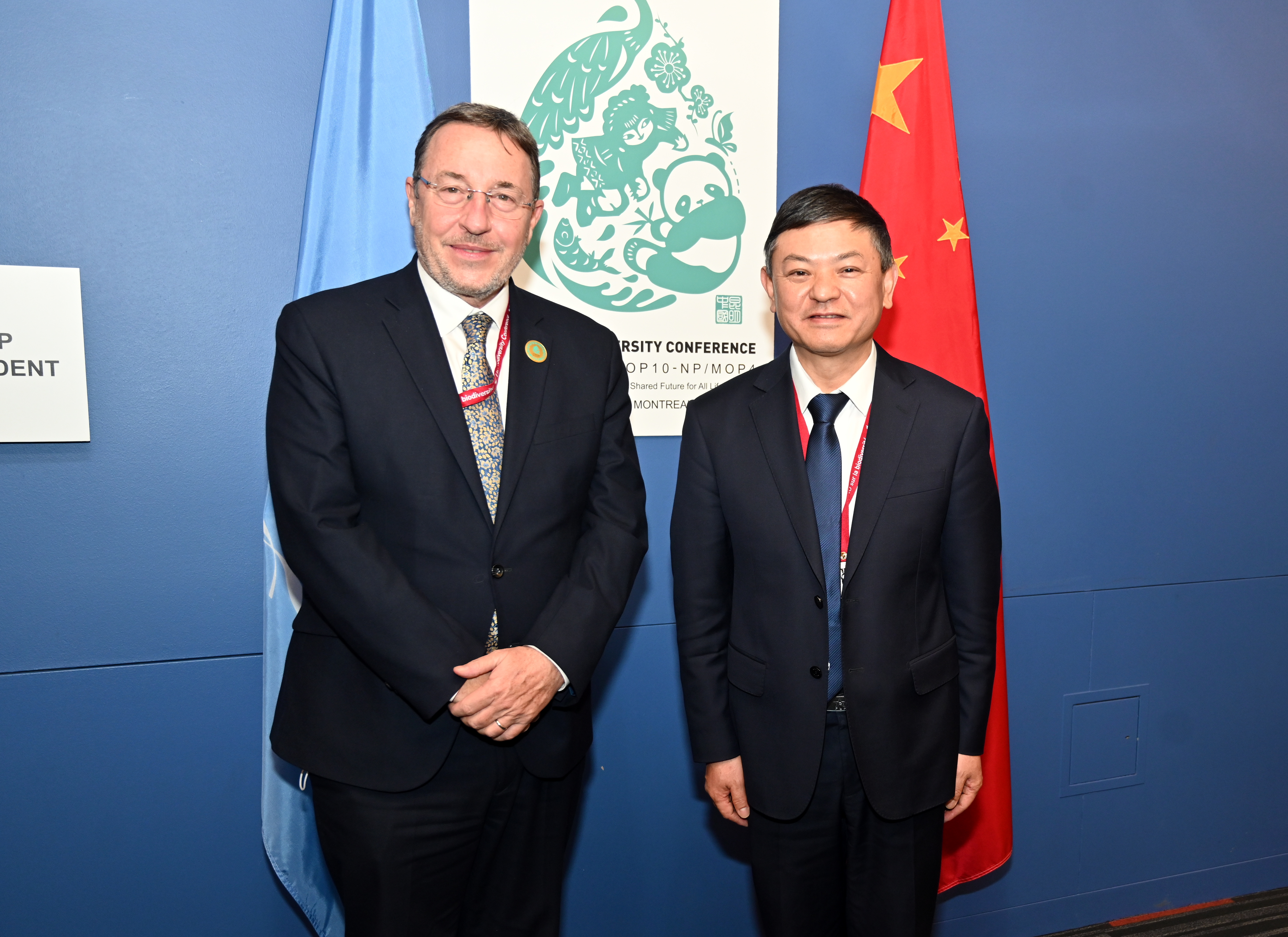Heading to Montreal | COP15 UNDP China Wrap-up
December 31, 2022

Group photo from the event titled "Exploration and practice of multi-stakeholder engagement in biodiversity conservation and sustainable use" in China Pavilion on 12th December
The UN Biodiversity Conference (Fifteenth meeting of the Conference of the Parties (COP15) to the Convention on Biological Diversity (CBD)) Part II was held in Montreal, Canada, from 7 to 19 December 2022.
With the conference theme of "Ecological Civilization: Building a Shared Future for All Life on Earth," COP15 Part II, successfully resulted in the adoption of over 60 resolutions to protect nature and agreement on the "Kunming-Montreal Global Biodiversity Framework" (GBF) to secure the future of humanity alongside that of the planet.
The GBF contains 23 targets for 2030, including a "30x30 target" calling for 30% of the earth’s terrestrial and marine habitats to be designated as protected areas. Agreement on other essential areas include benefit sharing from the use of Digital Sequence Information (DSI) on genetic resources, as well as resource mobilisation with the establishment of a Special Trust Fund (also known as the GBF Fund) in 2023 to support GBF implementation. Moving forward, the GBF will define the actions we must take now to stop biodiversity loss, how we fund these actions, and how we monitor and report on progress.
Since COP15 Part I, UNDP has worked closely with the COP Presidency, China, and many other stakeholders. During COP15 Part II, UNDP collaborated with the United Nations Environment Programme (UNEP) and its partners to help catalyze necessary actions for achieving the GBF vision through the “UNDP Nature Pledge”. UNDP is committed to achieving systemic change to respond to the threats facing the natural world.
UNDP and partners organized a number of signature events during COP15. Including, but not limited to, the following:
On December 11, the Global Biodiversity Framework Early Action Support Programme (GBF-EAS), supported by the Global Environment Facility (GEF) and jointly implemented by UNDP and UNEP, was launched. The program will support early implementation of the GBF in 138 countries around the world. This will be the first funding support available to countries following the adoption of the Framework. GBF-EAS also highlights the need for adequate, predictable, and accessible financing.
On December 14, UNDP hosted activities during COP15’s Finance and Biodiversity Day with partners such as the CBD Secretariat, World Bank Group, and UNEP Financial Initiative (UNEP FI). In order to integrate biodiversity into financial decision-making and align financial flows with the post-2020 GBF, it is critical for the global financial community to engage in discussion, share perspectives, and communicate on their actions, achievements, and commitments related to the integration of biodiversity within financial strategies, policies, and decision-making. In particular, the Finance and Biodiversity Day Reception marked the official launch of the International Climate Initiative (IKI) and Taskforce on Nature-related Financial Disclosure (TNFD) project “Enabling and Scaling up Nature-related Financial Disclosures.” This pivotal initiative will promote more integrated risk management and disclosure practices in global markets and to integrate nature and biodiversity considerations into all investment and corporate decisions.
On December 16, with the support of Germany, 23 countries, led by Colombia, signed a declaration establishing the NBSAP Accelerator Partnership. This initiative will support governments in fast tracking the implementation of their National Biodiversity Strategies and Action Plans (NBSAP). During the launch event, many Parties and stakeholders, including China, expressed support for the initiative, with Germany, the EU, and Norway announcing financial commitments through UNEP and UNDP which will co-host the NBSAP Accelerator Partnership Global Coordination Unit.
On December 16, UNDP Biodiversity Financial Initiative (BIOFIN) hosted activities to celebrate its ten-year anniversary. Now present in 41 countries, BIOFIN is working with governments, civil society, vulnerable communities, and the private sector to catalyze investments in nature. During COP15, Canada, the UK, Norway, and other governments announced new financial commitments for BIOFIN. In addition to the Eighth Replenishment of the GEF Trust Fund (GEF-8), BIOFIN will be scaled to develop national Biodiversity Finance Plans and implement finance solutions in an additional 90-100 developing countries and CBD Parties.
During COP15, Achim Steiner, UNDP Administrator, attended and spoke at the COP15 High Level Segment as well as multiple other bilateral and multilateral meetings.

UNDP Administrator Achim Steiner with COP15 President and China's Minister of Ecology and Environment HUANG Runqiu
During COP15 Part II, UNDP invited Chinese representatives to share good practices from China in many multilateral meetings, while also co-organizing many side events with the Ministry of Ecology and Environment (MEE) of the People’s Republic of China. The following is a summary of a selected few:
On December 10, MEE and UNDP co-hosted the side event, “National action to optimize the in-situ conservation system of biodiversity: China's natural reserve system reform and practice”, in the China Pavilion. Over the past 43 years, UNDP and the Chinese government have cooperated to protect nature. In particular, in the past decade, China has made important progress in the management of protected areas and national parks.

UNDP Senior Technical Advisor on Ecosystems and Biodiversity Santiago Carrizosa talks with head of the Chinese delegation to COP15 and China’s Deputy Minister of Ecology and Environment ZHAO Yingmin
On December 11, UNDP organized a side event titled, “Sovereign debt for nature: A mapping of solutions to avoid ‘too little too late’ for nature-positive outcomes”. Discussions explored debt for nature swaps, strengthened partnerships, highlighted nature-related financial innovations and opportunities to achieve scale, and showcased specific cases of UNDP actively leading and participating in relevant research in this field.
On December 12, MEE’s Nanjing Institute of Environmental Sciences, UNDP, UNEP International Ecosystem Management Partnership (UNEP-IEMP), together with other research institutions and international organizations co-organized the side event themed, “Exploration and practice of multi-stakeholder engagement in biodiversity conservation and sustainable use”.

UNDP Assistant Resident Representative in China Dr. Ma Chaode shared UNDP's practices of China's biodiversity conservation in China Pavilion on 12th December
On December 13, the Shanghai delegation and the UNDP BIOFIN global team conducted in-depth discussions on the implementation of the BIOFIN pilot project in Shanghai and jointly planned for the project’s next stage. The BIOFIN pilot project in Shanghai will draw on experience in China and abroad, actively take advantage of the city as a financial hub, and create a replicable model in promoting sustainable investment and financing.
On December 14, a side event titled, “The integration of city and nature, the intersection of estuary and ocean” was held in the China Pavilion during which the report “BIOFIN Policy and Institutional Review (PIR) for Shanghai” was launched.

Group photo of the Shanghai Day event in China Pavilion on 12th December
On December 14, the Chinese Research Academy of Environmental Sciences (CRAES), UNDP, and China’s Endangered Species Scientific Commission (ESSC) jointly hosted the side event of "Ecological Civilization: Chinese approach for harmonious coexistence between human beings and nature" in the China Pavilion. The event introduced global practices to promote ecological civilization and shared cases from UNDP-GEF work in China.
On December 20, UNDP China released "Nature’s Riches", an online exhibition for biodiversity and COP15, showcasing UNDP’s conservation work, and aiming to educate the public about ecological protection as well as the global biodiversity targets agreed to at the Conference. The exhibition attracted hundreds of visitors leaving messages as well as sharing their thoughts.
Representatives from UNDP also participated in many of the following side events:
On December 11, during the event, “Invest in nature: High level dialogue on Partnership of Biodiversity and Finance (PBF)”, representatives from international organizations, NGOs, and financial institutions discussed how to strengthen joint efforts to close the financing gap for nature and synergies between biodiversity conservation and climate action.
On December 12, “The Little Book of Investing in Nature” (Chinese version) was launched, which included new financial tools from the UNDP BIOFIN methodology: such as how to increase income, reduce unnecessary expenditure, and improve efficiency in biodiversity financing.

Launch event of the “The Little Book of Investing in Nature” (Chinese version)
On December 13, during the event titled “Strengthen local biodiversity actions: Practices and contributions from China”, BIOFIN China and ICLEI (Local Governments for Sustainability, formerly known as International Council for Local Environmental Initiatives) committed to jointly exploring more opportunities to localize the biodiversity finance methodology and capacity-building.
On December 15, during the event titled “China's role in biodiversity conservation and sustainable development”, the China Council for International Cooperation on Environment and Development (CCICED) shared the successful experience and research outcomes over the past 30 years, and UNDP reaffirmed its commitment to continued collaboration with CCICED to advance a wide range of GBF finance solutions across 140 countries in 2023.
On December 16, at the “Forum on biodiversity and energy revolution”, UNDP highlighted it’s Nature Pledge and Energy Offer including the Africa Mini-grids Programme and shared that it will explore options for collaboration with the Global Energy Interconnection Development and Cooperation Organization (GEIDCO) in China and in African countries.

 Locations
Locations


